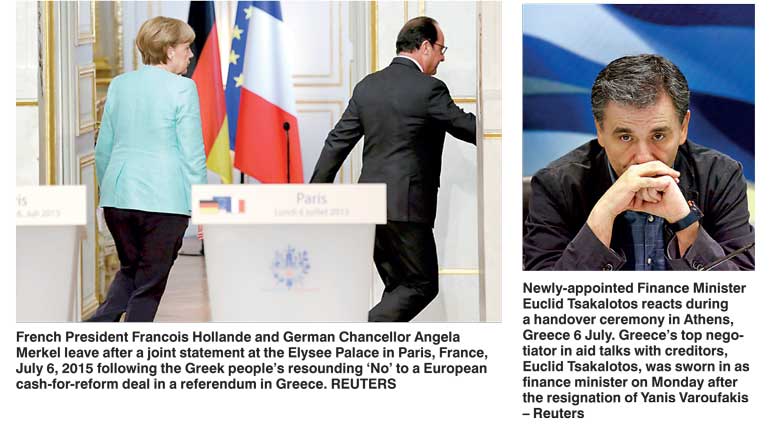Friday Feb 20, 2026
Friday Feb 20, 2026
Wednesday, 8 July 2015 00:00 - - {{hitsCtrl.values.hits}}

France and Germany told Greece on Monday to come up with serious proposals in order to restart financial aid talks, a day after Greeks voted overwhelmingly to reject more austerity.
German Chancellor Angela Merkel and French President Francois Hollande, the euro zone’s most powerful leaders, said Athens must move quickly if it wants to secure a cash-for-reform deal with creditors and avoid crashing out of the single currency.
Raising the pressure on Greek Prime Minister Alexis Tsipras before a euro zone summit on Tuesday, the European Central Bank decided to keep a tight grip on funding to Greek banks.
By voting decisively against tough bailout conditions, as Tsipras had urged them to do, Greeks have strengthened his negotiating hand. But the crisis remains acute, with the country’s banks already closed for more than a week to avoid a massive outflow of money that could lead to their collapse.
Only emergency support from the ECB is keeping the banks afloat and saving Greece from a chaotic euro exit that would inflict more pain on its people and gravely damage the currency, the strongest symbol of the EU’s drive for an ‘ever closer union’ on a continent once ravaged by two world wars.
In a warning shot to the banks, the ECB raised the amount of collateral they must post for any loans. The move does not affect the lenders right away, but served as a reminder that their fate lies in its hands.
In a sign that Athens is keen to seek a new deal, Greece’s combative Finance Minister Yanis Varoufakis resigned, apparently under pressure from other euro zone finance ministers who did not want him as a negotiating partner.
Tsipras had earlier promised Merkel that Greece would bring a proposal for a deal to Tuesday’s summit, a Greek official said. It was unclear how much it would differ from other proposals rejected in the past.
Late on Monday, the prime minister’s office said Tsipras had spoken with EU Commission President Jean-Claude Juncker and Hollande. His office did not provide details about the conversations.
After talks with Hollande earlier in the day in Paris, Merkel said, “We say very clearly that the door for talks remains open and the meeting of euro zone leaders tomorrow should be understood in this sense.”
But, she added, the requirements were not in place at the moment to start negotiations about a concrete euro zone bailout fund programme.
Top officials in both the United States and Japan called on both sides to seek a resolution.
But an ECB governing council member, Ewald Nowotny, held out the possibility of bridge funding for Greece while a new bailout programme is being negotiated. “Whether it’s possible is something that has to be discussed,” he told Austrian state TV.
After the Greek ‘No’ vote, gloomy officials in Brussels and Berlin said a Greek exit from the currency area now looked ever more likely.
Greece’s political leaders, more accustomed to screaming abuse at each other in parliament, issued an unprecedented joint statement after a day of talks at the president’s office backing efforts to reach a deal with creditors.
They called for immediate steps to reopen banks and said any deal must address debt sustainability – code for reducing Athens’ crushing debt – but gave no hint of concessions from the Greek side toward its creditors’ demands for deep spending cuts and far-reaching reforms of pensions and labour markets.
To win any new deal, Greece will have to overcome deep distrust among partners, above all Germany, Greece’s biggest creditor and the EU’s biggest economy, where public opinion has hardened in favour of cutting Greece loose from the euro.